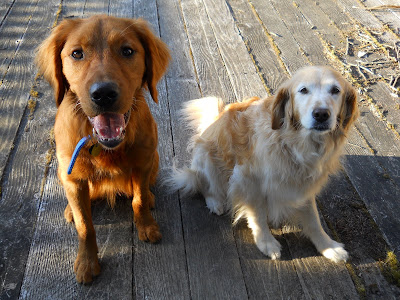Monday, August 29, 2011
Dickens, Daisy, And The Circle Of Life
Yesterday, as Dickens was in another part of the back yard chewing a stick, Daisy found one of “his” tennis balls––actually one of hers––and took it gently into her mouth. An instant later she was knocked off her feet by a large red projectile moving at high speed that snatched the ball from her and sped off. Daisy, her ears back and her tail dragging, came over to me and curled up at my feet, panting and trembling.
As it has been ever since the first time Dickens did this––and he’s done it many times––my initial reaction was anger. There was nothing to be done about it, of course––Dickens had no idea what he was doing was wrong––so I sat with Daisy and gave her a few treats from my pocket.
So far the toy-sharing conundrum refuses to come to an equitable resolution, but it provided some perspective this afternoon as I was getting ready to go for a motorcycle ride. As it’s been my custom to do, I loaded a Kong for Dickens to distract him as I left the house. I thought about loading one for Daisy, too, but realized Dickens would only take it away from her as he does with tennis balls.
Then I remembered why there are two Kongs in the house in the first place, and the situation came into clearer focus.
Dickens’ addition to the pack consisting of Daisy and me is a repeat of Daisy joining the previous pack of Winzer and me. In the earlier instance, Daisy trotted in and took over, neatly inserting herself in the hierarchy between me and Winzer, who suddenly found himself with two masters instead of one. She routinely hoarded all the toys, even the ones she never played with, just so Winzer couldn’t have them. If I loaded two Kongs before leaving the house, and handed one to each dog, when I returned Daisy had two Kongs, and Winzer had a wistful look.
I’ve read over and over that dogs are happiest in a pack where all the members have clearly specified rankings. If a dog comes into a pack that has no structure, the dog will impose its own, with itself as the leader. In the wild, the pack leader, or alpha dog, has certain duties and responsibilities. The alpha gets the best food, and eats first. The alpha sleeps where it wants to. The other dogs wait their turn, and get out of the alpha’s way when it approaches.
Domestic dogs are little different from their wild ancestors in this way. Dogs who are fed from the table, or sleep on the humans’ bed, are enjoying alpha privileges, and often assume they’re in charge of the pack. This leads to behavior like uncontrollable barking (it’s the alpha’s job to warn the pack of danger), charging doors to be the first in or out (the subordinate dogs defer to the alpha), and other annoying behaviors. Many dog owners don’t realize this is simply the way dogs are hard-wired, and that the things that drive them crazy about their dogs are simply the normal canine response to a power vacuum.
Which brings me back to Daisy. Dog owners anthropomorphize their pets to a high degree, and in that respect I don’t claim to be any different. But I have to admit that what I see as bullying on Dickens’ part might well be seen by Daisy as a simple re-ordering of the pack, neatly mirroring the reorganization that took place when she demoted Winzer all those years ago.
This won’t stop me from giving Daisy an extra treat when Dickens isn’t looking, or scratching her behind the ears when she asks for attention by putting her head on my leg. But it’ll make me feel less resentful toward Dickens, and that’s good, too, because a good alpha not only corrects pack members when they misbehave, he forgives them afterward.
Subscribe to:
Post Comments (Atom)

No comments:
Post a Comment